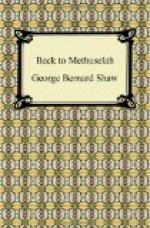might feel as deeply as they could that a God with
body, parts, and passions could be nothing but an
anthropomorphic idol: no matter: people
at large could not conceive a God who was not anthropomorphic:
they stood by the Old Testament legends of a God whose
parts had been seen by one of the patriarchs, and
finally set up as against the Church a God who, far
from being without body, parts, or passions, was composed
of nothing else, and of very evil passions too.
They imposed this idol in practice on the Church itself,
in spite of the First Article, and thereby homeopathically
produced the atheist, whose denial of God was simply
a denial of the idol and a demonstration against an
unbearable and most unchristian idolatry. The
idol was, as Shelley had been expelled from Oxford
for pointing out, an almighty fiend, with a petty
character and unlimited power, spiteful, cruel, jealous,
vindictive, and physically violent. The most
villainous schoolmasters, the most tyrannical parents,
fell far short in their attempts to imitate it.
But it was not its social vices that brought it low.
What made it scientifically intolerable was that it
was ready at a moment’s notice to upset the
whole order of the universe on the most trumpery provocation,
whether by stopping the sun in the valley of Ajalon
or sending an atheist home dead on a shutter (the
shutter was indispensable because it marked the utter
unpreparedness of the atheist, who, unable to save
himself by a deathbed repentance, was subsequently
roasted through all eternity in blazing brimstone).
It was this disorderliness, this refusal to obey its
own laws of nature, that created a scientific need
for its destruction. Science could stand a cruel
and unjust god; for nature was full of suffering and
injustice. But a disorderly god was impossible.
In the Middle Ages a compromise had been made by which
two different orders of truth, religious and scientific,
had been recognized, in order that a schoolman might
say that two and two make four without being burnt
for heresy. But the nineteenth century, steeped
in a meddling, presumptuous, reading-and-writing,
socially and politically powerful ignorance inconceivable
by Thomas Aquinas or even Roger Bacon, was incapable
of so convenient an arrangement; and science was strangled
by bigoted ignoramuses claiming infallibility for
their interpretation of the Bible, which was regarded,
not as a literature nor even as a book, but partly
as an oracle which answered and settled all questions,
and partly as a talisman to be carried by soldiers
in their breast pockets or placed under the pillows
of persons who were afraid of ghosts. The tract
shops exhibited in their windows bullet-dinted testaments,
mothers’ gifts to their soldier sons whose lives
had been saved by it; for the muzzle-loaders of those
days could not drive a projectile through so many
pages.




